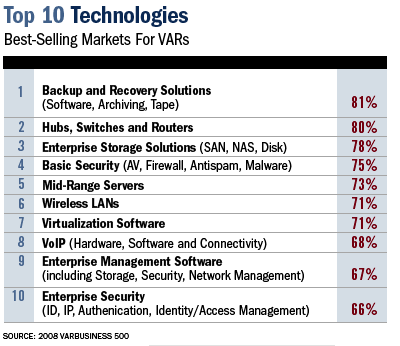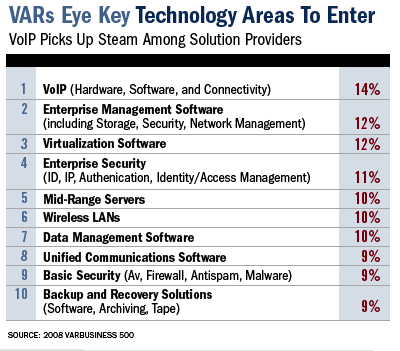The Technology Of The VARBusiness 500
Technology makes the VARs' world go round. Some of it is tried and true, the foundation that builds a billion-dollar business. But others are hot and cutting edge. A savvy solution provider knows that somewhere in the middle lies the secret to his or her success.
For example, virtualization is one of the hottest technologies today. Although it has been around for several years, it's only been in the past few years that it's taken off, and can be considered the low-hanging fruit for the channel. Resellers can benefit from the fact that virtualization is not just a one-time hit in selling a product, but provides ongoing opportunities for VARs to go out, consult, install and provide ongoing maintenance for customers.
Several characteristics drive the market, such as low barrier to entry for resellers. In addition, the growth spurt means that there's not a great deal of pressure from competitors--it's still a fairly new concept for a lot of customers.
In the virtualization space, opportunities can be found not just in installing software products from leaders in the field, such as VMware Inc., Citrix Systems Inc. or Virtual Iron Software Inc., but in add-on technology. While VARs can tell their customers about all the benefits virtualization has to offer--energy savings, footprint consolidation and more efficient disaster recovery--the gold can be found by looking at the big picture and offering value adds such as virtualization security.
Another technology popular among the VARBusiness 500 is infrastructure services, which offers managed solutions based on a service model. The idea is to provide customers with only the services they need at a given time indicated by user level. As customer needs fluctuate, services can be added, reallocated, scaled back or eliminated altogether. For example, an accounting firm would need more capacity during tax season time, but after April may scale back or reallocate services to a different area, such as testing.
One VARBusiness 500 vendor that has gotten into the relatively new infrastructure field is St. Louis-based Savvis Inc. (VARBusiness 500 rank 73). The company was founded in 1995 as an ISP, made several acquisitions and launched an IPO on its way to transitioning as an infrastructure services provider. Savvis focuses on providing IT services to business enterprises and federal agencies.
The company stresses its ability to provide flexibility and offers cost-effective hosting models to meet specific needs of an enterprise. Models can range from unmanaged co-location services to fully managed, virtualized utility services. Its hosting services delivery platform and operational support systems deliver enterprise hosting throughout North America, Europe and Asia. The company currently operates 30 global data centers.

Lynn Smullen-Volz, vice president of partner and carrier services at Savvis, said that with the complexity of IT services, keeping up with ever-changing technology and sticking to a budget, the company fills the need to provide scalability.
"Outsourcing was the model in the early 1980s," she said. "Moving to Infrastructure-as-a-Service leads to flexibility; it's not so black and white. You pay as you go and you pay for what you need as you grow."
Another need that Savvis has identified is the need for companies to focus on their core competencies, rather than worry about IT infrastructures.
"If it's not their main business, they don't know how to run an infrastructure for scale and how to grow and support it as it grows in a complex space," she said. "There needs to be forward thinking, such as 'What are the new regulations?' or, 'How can I utilize resources from existing platforms to next-generation platforms?' "
Infrastructure services are also ripe for further growth, according to industry watchers. In a 2008 report from tech research firm Gartner Inc., Stamford, Conn., market demand for hosting services will expand. Gartner forecasts that the North American Web hosting market will grow from $8.8 billion in 2005 to $21.4 billion in 2011.

Other tech companies are seeing demand for solutions that impact business challenges, an area that is gaining momentum, according to integrated information and communications technology provider Logicalis Group, Bloomfield Hills, Ill. (VARBusiness 500 rank 71), a division of Datatec Ltd., based in London. "We're seeing that storage, Intel and Unix servers, managed services, unified communications, business intelligence and portals are all really strong," said Terry Flood, president of Logicalis N.A.
One factor driving this demand is that customers are looking for technology solutions to make their businesses more efficient. According to Flood, there are many benefits that come from these solutions and most companies, he said, are realizing that it is the right time to invest in this area.
"Consolidation and virtualization continue to drive the majority of the demand for new systems and software," Flood said. "Solutions that provide unified communications and portals focus on improving productivity and lowering costs in corporate communications."
Flood said he is also seeing an increase in the demand for business intelligence solutions as companies try to get access to better data to help them make informed business decisions.
Looking forward, opportunities in this sector look bright, according to Flood. "Our customers are spending their money today on technology solutions that directly affect the bottom line," he said. "In the future, our customers will continue to be faced with many challenges such as revenue growth, cost reduction, skill shortages and risk management. The demand for solutions that address these areas along with the consulting skill sets to integrate them will continue to be strong well into the future."